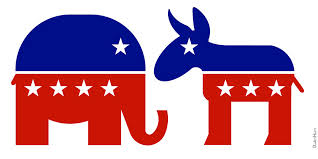Political Scope with Matt Nalefski: Donkey Debate—Episode 1

On Oct. 13, the five Democratic presidential candidates met in Las Vegas for the first of a series of six primary debates.
The debate, moderated by CNN’s Anderson Cooper, began with Sheryl Crow’s rendition of the Star Spangled Banner and proceeded to have the candidates give their introductory speeches by increasing order in the polls—the first being Lincoln Chafee, the last being Hillary Clinton.
In his opening remarks, Chafee suggested candidates should assess each other’s experience, integrity, and vision for the future. Chafee, a Republican-turned-Independent-turned-Democrat former senator and governor of Rhode Island, attempting to make himself standout relative to the other candidates, particularly Hillary Clinton, said, “I am proud that over the almost thirty years of public service, I have had no scandals.” He went on to stress his high ethical standards. The rest of the debate for this fickle political party member was spent in relative silence at a total of 9:11 and, whenever he had the chance to speak, his message was delivered as slowly and awkwardly as his opening statement.
The next candidate’s speaking time managed to make Chafee seem almost nonexistent: Jim Webb. Webb, the former Secretary of the Navy and Senator from Virginia, managed to take 15:35 over the entire debate to deliver his message.
In his introductory remarks, Webb stressed his distance from politics and stressed that, “in a Webb administration, the highest priority will be the working people, who every day, go out and make this country stronger at home…” and the need for “common sense foreign policy.” Throughout the debate, Webb maintained his stances on most issues are where the Democratic Party has historically been and that the greatest strategic threat to the United States is China. Under a Webb administration, China’s cyber-terrorism and military aggression wouldn’t be tolerated.
Coming out with some great quotes—most of which were just in the first few minutes—the next candidate was Martin O’Malley. The former Mayor of Baltimore and Governor of Maryland insisted the reason he knew how to accomplish things was because of how he is clear about his principles. He stressed the economic situation throughout the debate stating, “Our economy isn’t money, it’s people.” Confident as if he were leading in the polls, he spoke well—drawing attention away from his only 17:56 of talk time—“The future is what we make of it. We are all in this together.”
Continuing on with the “bern,” the next candidate was Sen. Bernie Sanders of Vermont, who spoke the second-most amount of time at 28:05. Throughout the debate, Sanders mentioned the broken prison system, the money of which he feels should go into the economy and education. He averred the United States should look to Denmark, along with the Scandinavian countries, and their Democratic-Socialism for the solution to America’s woes.
Sanders did very well up against the next candidate, Hillary Clinton, who managed to hold her own and maintain her spot in the lead. Starting out with populist issues, in her opening remarks Clinton stressed how her presidential bid a matter of the fact that she would be the first woman president. Clinton spoke freely without much hindrance—other than Anderson Cooper’s halfhearted attempts to stop her—for a total of 31:05, often drifting quite widely from the topic. When the issue of emails arose, she changed the topic by saying the American people are tired of hearing about it. Then, in a true moment of “Feeling the Bern,” Sanders piped in and announced, “the American people want to know if we’re going to have a democracy, or an oligarchy… Enough of the emails, let’s talk about the real issues facing the American people.” Clinton laughed, shook his hand, and thanked him. When asked again about whether she would actually answer the question, Clinton responded with a brief “no,” and the room exploded with cheers.
In summary, the top 2 Democratic candidates took almost half of the debate and the other three took the other half. Clinton controlled the debate without much trouble and showed her dominance as the frontrunner. She also displayed an arrogant confidence and sense of invulnerability that seemed only to be eaten up by the audience. Sanders, although presenting a good show, did nothing too spectacular to rise in the polls. Of the bottom three candidates, O’Malley gave the best performance and, if it weren’t for his lack of name recognition, and the two frontrunners, would, I’m sure be the leader.
The one thing I’m sure about is this race is far from being over, but the Democrats seem to be much more united in their cause than their Republican opposition. The donkeys aren’t going down without a fight.
